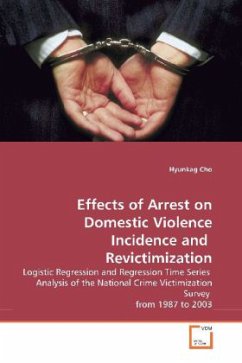The police in the U.S. have actively intervened in domestic violence since the 1980''s to hold batterers accountable by legal punishment, to prevent future violence, and to provide victims'' safety. However, research results of the effectiveness of the police intervention are inconclusive. This study used the National Crime Victimization Survey in the U.S. from 1987 to 2003 to examine whether arrest of batterers has an effect in reducing revictimization. The study results support the specific effect of arrest on victims'' safety. Logistic regression analysis of data from 2,462 victims showed that when the police arrested batterers, their chance of revictimization fell by half. However, the general effect of arrest on incidence rates is not as apparent as the specific effect. The time-lagged effect of arrest on incidence rates, which was shown in this study, needs future research for meaningful interpretation because there is currently no theory to explain such a delayed effect. Social work policy and practice fields can utilize the study results to develop informed, effective intervention strategies in domestic violence.
Bitte wählen Sie Ihr Anliegen aus.
Rechnungen
Retourenschein anfordern
Bestellstatus
Storno








